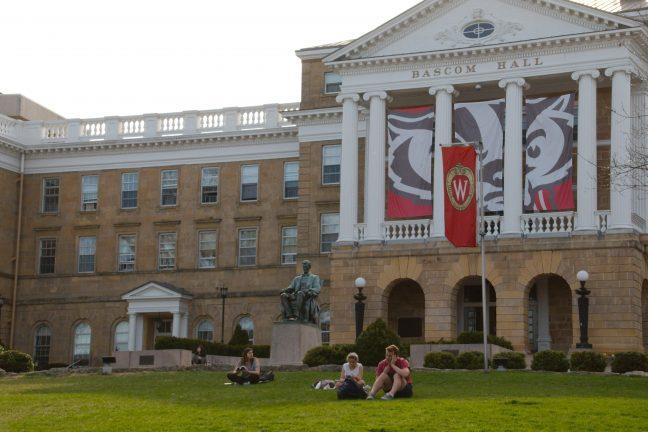As the University of Wisconsin prepares for a return to campus with in-person and online classes, graduate students share their concerns about the safety of teaching assistants and other in-person instructors.
UW’s reopening plan, called Smart Restart, involves both online and in-person classes. The majority of classes in the fall will be online, with some small classes held at spaced-out times in larger classrooms to allow for social distancing.
Political science graduate student and Teaching Assistants’ Association member Anna Meier said she didn’t feel the university listened to graduate student voices while creating the plan.
“[The university] is starting to listen to some faculty, and they’re definitely concerned about undergraduates, and those are really important populations, and I don’t want to diminish that, but there has been no efforts really to reach out to or listen to graduate students,” Meier said.
Director of University Communications Meredith McGlone said in an email to The Badger Herald some graduate students participated in the reopening planning through multi-disciplinary teams, and administrative leaders met with shared governance groups to hear feedback and provide updates on the reopening process.
UW Athletics makes ‘W’ crest black in response to student demands
Lauren Gerlowski, TAA member and graduate student, said the administration did not work as closely with the TAA as they would have hoped, and many graduate students still have unanswered questions.
Meier said graduate students who are teaching in the fall do not have a clear way to opt out of in-person teaching. To protect TAs, Meier said the university should create a way to guarantee graduate students can opt out of in-person teaching without disclosing detailed medical records if they or someone they live with is at high risk for the coronavirus.
Meier said the College of Letters and Science told her department, Political Science, how many in-person versus online classes they needed to have, and the department presented the college with a list of classes they could potentially hold in person.
Gerlowski, who will TA in the fall for the geography department, said her department surveyed those who will be teaching on their comfort level and ability to teach in-person in the fall. Gerlowski said though she doesn’t agree with having in-person classes under current COVID-19 numbers, she said she would teach in the fall in person if she needs to because she isn’t at high risk for the virus and lives alone.
Gerlowski said though the university is taking steps to prevent the spread of COVID-19, controlling a large number of undergraduates from breaking social distancing guidelines will prove a difficult task.
“To be clear, I do not feel comfortable being in a classroom teaching 20 people for an hour whatsoever, but it’s kind of at the point where you have to figure it out, because there’s way more people in my department that are at a higher risk than I am,” Gerlowski said. “At the same time, I think it’s rather unfair that any of us are being asked to be put at risk.”
Gerlowski said another part of the reopening plan that concerns her is the lack of a back-up plan if the university switches to online-only learning early in the semester due to a high number of COVID-19 cases on campus. Gerlowski said last spring’s online switch was difficult for students and teachers, so having a predetermined, published plan would make her feel better about returning to in-person classes.
DHS, ICE agree to revoke visa restrictions on international students
McGlone said the university is closely watching public health data throughout the city, county and state and is prepared to make any necessary changes to course delivery. Chancellor Rebecca Blank described some of the health precautions the university will be taking to keep students safe in the fall in a blog post.
“[Our plans] include a robust testing regime, contact tracing, symptom monitoring, enhanced cleaning protocols, mandatory wearing of face coverings in university buildings and public spaces where physical distancing isn’t possible and physical distancing in all classrooms,” Blank said. “These steps, along with our plans for a mixture of face-to-face and remote instruction, make us optimistic about our ability to reopen some on-campus activities this fall.”
Additionally, McGlone said UW has provided resources for instructors for teaching in person and will hold virtual town halls and workshops.
Gerlowski said one concern she has in the classroom is dealing with students who refuse to wear a mask. For TAs who may already feel nervous about speaking in front of a class, not knowing how to deal with a student not wearing a mask may be difficult, Gerlowski said.
“[If a student comes in without a mask on] do I have the authority to remove them from the classroom? Do I have the authority to end class?” Meier said. “Especially for me as a young female TA who already struggles with presenting authority as it is, I would be really worried about [if] that situation were to escalate.”
McGlone said the university will have expectations for undergraduates to follow for social distancing outside of class. Vice Provost for Instructional Continuity and Academic Affairs Steve Cramer said in a statement to The Herald that a team is working on an editable syllabus for instructors to use to outline classroom behavior expectations.
Meier said she takes offense to the idea that because graduate student TAs are often young and at lower risk, they should be required to teach.
“I’m not teaching in the fall, but if I were, I would not want to have to choose between coming to campus [and] risking my health and the health of everyone I come into contact with or owing the university full tuition when I have no income,” Meier said. “I don’t want to have to choose between being safe and having no income and a disease that has really long terrible health implications even if I survive it.”


















